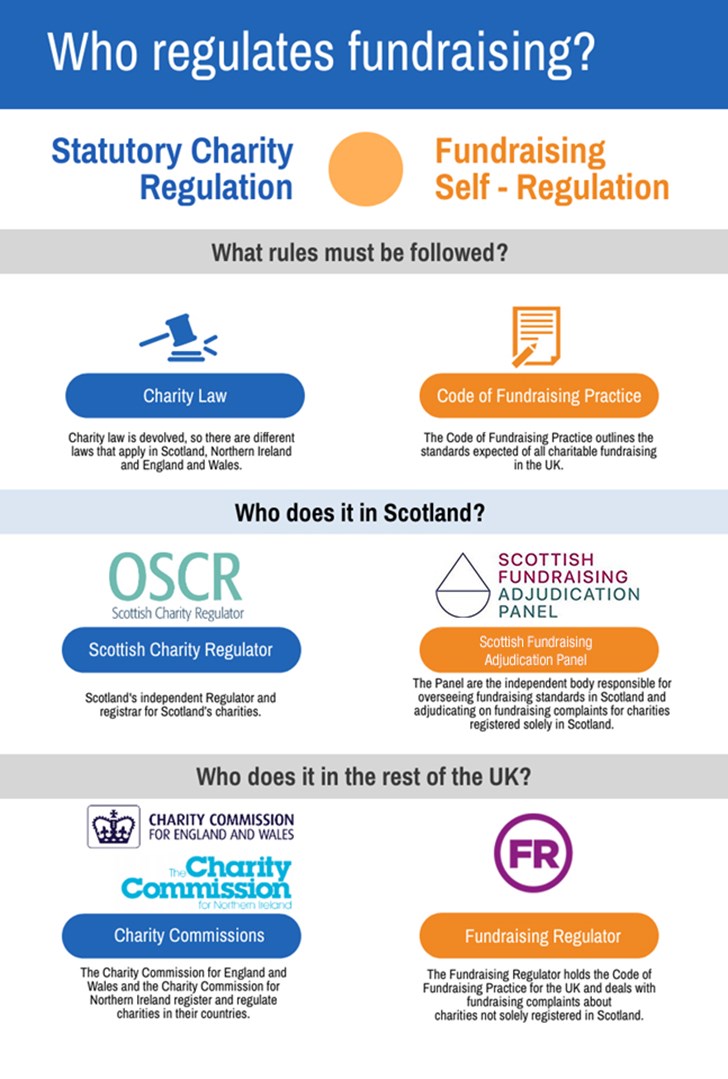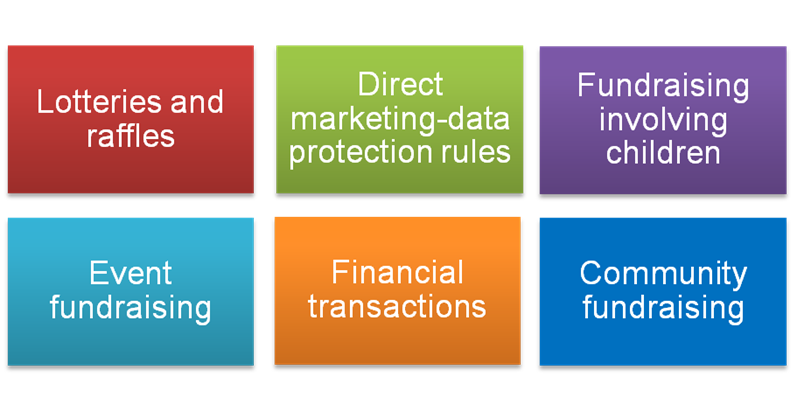Self-regulation and OSCR's role
The fundraising landscape in the UK can be complex. Fundraising regulation is a mix of statutory and non-statutory rules and involves different regulators depending on the rules involved.
Charity trustees of Scottish charities have legal duties and responsibilities under the 2005 Act. We explain how these relate to fundraising in the next section.
The Code of Fundraising Practice sets out the standards expected of all fundraising across the UK.

UK fundraising regulation
UK fundraising regulation is split between:
- non-statutory regulation: standards set which cover the legal requirements and best practice
- statutory regulation: requirements set out in law.
These two types of regulation fall under different organisations:
|
|
Non-statutory regulation: The Code of Fundraising Practice and Rulebooks |
Statutory regulation: Charity law |
|
Scotland |
Scottish Fundraising Standards Panel |
Scottish Charity Regulator (OSCR) |
|
England and Wales |
Fundraising Regulator (including cross-border charities)
|
Charity Commission for England and Wales |
|
Northern Ireland |
Charity Commission for Northern Ireland |
Self-regulation – legal responsibilities and best practice
In Scotland the system of non-statutory regulation is referred to as self-regulation, in the rest of the UK non-statutory regulation is referred to as independent regulation. This means that charities are the first point of call for any concerns about their fundraising and that charities play a role in setting the fundraising standards for the sector.
The Code of Fundraising Practice and its associated Rulebooks for face to face fundraising outline the standards and legal responsibilities expected of all charitable fundraising across the UK. The standards were developed by the fundraising community through the work of the Institute of Fundraising (IoF) and Public Fundraising Association (PFRA).
The Fundraising Regulator now has responsibility for the Code and the rulebooks.
Fundraising complaints
Under self-regulation, individual charities are the first point of call for any complaints about fundraising practices. Making sure charities can have robust procedures in place for dealing with complaints is a key part of self-regulation. If your charity doesn’t have a complaints procedure that covers fundraising you might want to adopt the Scottish Fundraising Standards Panel's model complaints handling procedure.
Where a charity is unable to resolve the complaint, the complainant can escalate it to one of the following:
- Scottish Fundraising Standards Panel: for charities only registered in Scotland
- Fundraising Regulator: for charities registered in the rest of the UK (England and Wales and Northern Ireland), including cross-border charities.
The Institute of Fundraising is the professional membership body for UK fundraising and has a range of guidance and advice on many fundraising matters.
OSCR’s role – statutory regulation
OSCR is responsible for making sure that charities follow the rules under the 2005 Act. OSCR will only usually become involved in a fundraising complaint where there is a risk to public trust and confidence in the charity or the wider sector. Specific concerns we look at are:
- a breach of charity trustee duties, or misconduct which includes mismanagement, by the charity’s trustees
- a risk to charitable assets.
Other laws
As well as the rules under the 2005 Act and the 2009 Regulations there are a range of rules that you should be aware of that apply to different types of fundraising activities, which are not covered in this guidance. If you need to you should get advice to make sure that your charity and those who fundraise for you know what rules to follow.
The Code of Fundraising Practice outlines these other laws and the types of activities they apply to, such as:

